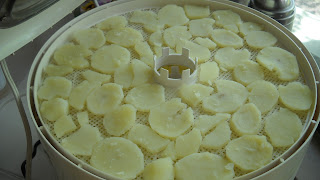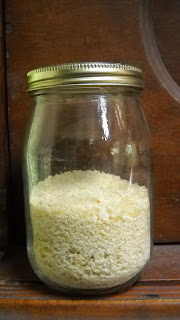Dehydrated cubed potatoes
We grow a lot of potatoes in our garden and store them in the root cellar over the winter. By spring they're starting to sprout or shrivel, so I set some aside for planting and I bring the rest in to dehydrate. We use the dried potatoes until the next crop is ready. They're also great to take along when we go camping.
In the picture above, the two jars are full of dried cubed potatoes. I peeled and partially cooked the potatoes before spreading them on drying racks. I usually cook them until they're about 2/3 done cooking. Then I drain them and run cold water over them to stop the cooking process. This also cools them so that I can handle them without burning my fingers.
But let's back up a minute. After the potatoes are peeled and I'm cutting, slicing, shredding, or cubing the potatoes, I put them in a big bowl of water that has a Vitamin C tablet crushed and mixed with the water. This keeps the potatoes from turning brown or purple (yes, they do sometimes turn a reddish-purple, or even black). You can use ascorbic acid, which is Vitamin C but sold in bottles for preserving the color of fresh foods, or any of the "fruit fresh" products to help retain the color. They only need to be in the water for a couple minutes, then I remove them and dump them into the pan of boiling water.
When they're done I dump all the trays of potatoes into cake pans, then using my canning funnel, I pour them into jars. When I'm canning I set aside any jars that have tiny chips in the rim, or the ones that aren't 'real' canning jars, and I use them for dried food. I can also reuse a lid that had previously been used to pressure can. They're not safe to re-use for canning but they're great to use on jars of dehydrated food.
We also use a meat slicer to slice potatoes for dehydrating. These can be reconstituted and used for scalloped potatoes, or for fried potatoes and onions, and many other dishes.
I cook them until they're partially cooked, then spread them on dehydrator racks. This is my Nesco dehydrator.
This is what they look like when they're almost done. In the dehydrator they only take a few hours to dry, but in the oven or air-drying they take a day or two, depending on temperature and humidity.
These are shredded potatoes that I'm ready to boil. They cook quickly so I only leave them in the water for about two minutes. I unintentionally learned how to make instant mashed potatoes the first time I dried shredded potatoes.
The 'shredded' potatoes were overcooked and stuck together, and they were a mess to spread on the dehydrator racks!
No problem! When they were done dehydrating I put them in the blender and made potato granules and we use them like instant mashed potatoes.
The next batch went better. I dumped the shredded potatoes into the boiling water and fished them out about 2 minutes later. You can see that these are separating and spreading better on the racks.
These are commercial shredded potatoes. I got an incredible deal on eight bags of frozen shredded potatoes and dehydrated all eight bags spread on racks and placed on shelves above and behind our woodstove.
I also made more 'instant mashed" potatoes this year. I don't recommend plastic bags for long-term storage, but I used this tortilla bag to store these to take on camping trips.
Here's a closer look at the cubed, dried potatoes, also stored in a tortilla bag for camping. I prefer not to haul my glass jars out into the back-country. Tortilla bags are great because they have good ziplock closures.
A closer look at the finished dehydrated potato slices. They look a bit like potato chips but they're not light and flaky. They need to sit in water for a while to re-hydrate and soften, and then cooked.
Potatoes are a versatile food that often gets a bad rap as being "fattening" or starchy. But when you work hard growing your own food you probably work it off, and some of the 'fattening" qualities come from the things that are often added to the potatoes, either during cooking or at the table. In a preparedness or emergency situation, potatoes can provide more to keep you going than a lot of vegetables contain. So don't be afraid to grow or buy them and add them to your storage. Dehydrating is a good way to keep them for a longer time. I know of at least two people who dry potatoes and keep adding them to a 5-gallon bucket until it's full, then they throw in an oxygen absorber and seal the buckets. They live in warmer climates and don't have root cellars, so both use dehydrating as a way to preserve potatoes.
Potatoes can be canned, too. The first time I canned them I cut them into small cubes and when I used them, they became mashed potatoes. The next time I cut them into large quarters and they canned up great. Potatoes must be pressure canned, not water-bath canned.
Please leave comments or questions below, or email them to povertyprepping@yahoo.com
Susan













THANK YOU SUSAN. I look so forward to your posts. They are definitely essential if our family is going to become self sustaining. Thank you for showing me how to take us in that direction.
ReplyDeleteYou're welcome! It's always nice to hear an encouraging word, so thank you for your comment.
DeleteSusan
Ohh thank you for this post. I have wondered just how to dry potatoes and now I know. I'm definitely going to try this. It will be brilliant when potatoes from the garden are done and those in the supermarket are expensive.
ReplyDeleteHomegrown potatoes are the best kind! It's quite easy to dehydrate them, so I'm sure you'll do fine!
DeleteSusan
Hi Susan
ReplyDeleteCan you leave the skins on? I hate to get rid of all the nutrients in them if its not really necessary.
Cheers
HT
Yes, you can leave the skins on. Sometimes the skins get flaky and come off easily, but you're right, it leaves more nutrients with the potatoes.
DeleteSusan
Do you still have to pre-cook the store bought shredded potatoes (in case I get a good deal someday)?
ReplyDeleteWe can get large quantities of fresh potatoes fairly cheap as we live near a huge potato farm!
We've shied away from buying them in bulk (they sell 50 pound bags!!!), in the past, because we weren't sure we wanted THAT many canned potatoes! Now that we can dehydrate them...and know how (Thanks to you!)...we just might go buy a big bag!!! ;)
No, you don't have to do anything to store-bought shredded potatoes. You can dehydrate them just as they are. They must do a pre-cook or at least a blanching on them at the processing plant.
ReplyDeleteGo buy that big bag of potatoes and dehydrate them! I'm happy to hear from someone excited about doing that!
Susan
Thanks for the "oops" on making potato flakes for mashed potatoes. That is a great idea. I will have to try it this year.
ReplyDeleteThank you so much Susan. I just turned 69 and still garden in my homemade raised beds. I'm always looking for way to preserve my vegetable crops.
ReplyDeleteI just found out that you can make a potato starter from potato flakes. The only problem with store bought potato flakes have bisulfite in them, so I did not want to use that. I'm so glad I found your instructions to make my own potato flakes. That is just what I was looking for.
Thank you so much for your great information. I just love it when I can find someone that is fugal with their money and know how to use their resources wisely.
It's wonderful to hear from someone who is doing these things, and especially so for someone your age! It encourages me to know that people do keep going, despite the growing collection of aches and pains I have!
DeleteBy potato starter I'm assuming you mean for sourdough? I would love to know how you do this. It would be helpful information for other readers as well, since if the time comes that we need to start our own sourdough, potatoes are something a lot of us will still have.
Thanks for writing!
Susan
Hi Susan,
ReplyDeleteDid I miss where it said what the shelf life is for the dehydrated potatoes?
Thanks
Sherri
Depends on your storage preference. I choose to oven can. My dried foods are good for 20-30 years! Now THATS prepping! Just Google "oven canning." Im sure youll agree that its the best thing since sliced bread (or potatoes). :)
DeleteYes, oven-canning is another way to preserve and store dried food. Some people prefer not to heat their foods to those temperatures after drying them, but for those who would like to try it, we already have a post devoted to how to oven-can.
Deletehttp://povertyprepping.blogspot.com/2012/06/oven-canning.html
Thank you for your comment!
Susan
Hi Susan
ReplyDeleteIt would be great if you could give us an example on how to rehydrate the potato for cooking. Example: 1 cup cubed potatoes need to sit in how much water for how long before you fry them up. Or for scalloped potatoes etc. I also have never done this and would really love to try it. You make it sound real easy, and I have a bunch of spuds starting to sprout from last years crop.
Thanks in advance for your help.
Debbie
Hi Debbie,
DeleteI used to rehydrate them in room-temperature water but recently I've discovered that they rehydrate better in hot water. I heat the water until it's steaming but not boiling yet, then pour it over whichever type of dehydrated potatoes I'm rehydrating. Add enough to cover plus about half an inch to an inch more. They float at first, so I gently push them under the water with a spatula.
When I'm ready to use them, I drain them and pat them dry with a towel. You can air-dry them a few minutes too, then use them like fresh potatoes.
Good luck!
Susan
I just found your blog and love the relevant info. We are 71 & 77 yrs. and garden also. But no potatoes. However, I'm going to watch for them on sale and try several of your ideas. We love to dehydrate anything we can get. Thinking the potato cubes would go in our large jars or asst. dehydrated veggies for soup and stew!!! Thanks so much. Barbara
ReplyDeleteI was wondering how long do you cook the potato cubes before dehydrating, and also their approx size? Also what time and temp do you use for dehydrating the various potatoes?
ReplyDeleteCan this be done with sweet potato cubes
ReplyDeleteI have dried sweet potato slices but not cubes. It seems like cubes would work too. I would keep the cubes on the small side like I do with white potatoes.
DeleteSusan
I am just learning the process of dehydrating foods. Which book would you recommend for preparing foods and then how to rehydrate for future use? I have a Nesco dehydrator, am buying myself for Xmas, as food saver. Thank you, Valerie
ReplyDeletedoes one have to put in an oxygen puck or can I simply store them in jars and so how long will they keep without the puck
ReplyDelete